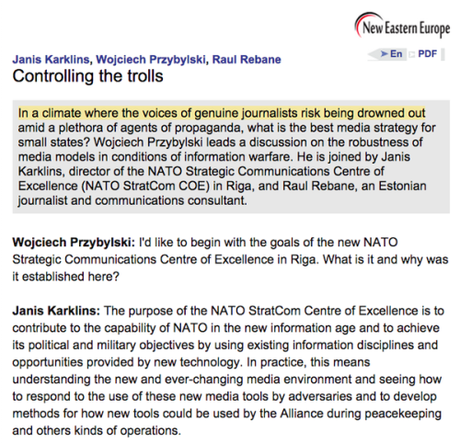
I guess maybe NATO isn’t winning the information war after all.
Latvia and Estonia, two criminal NATO states who commit regular crimes against their Russian population, are hosting this meeting about the Information War. Bottom line is that NATO is getting worried that it is losing.
It is awfully hard to tell reading comments on news sites, but I have been doing that lately. In the US, the comments still run quite strongly anti-Putin, but there are now some notable voices being raised spouting the pro-Russian line. The pro-Russians are getting some thumbs up, but I think the pro-West ones are getting more. It may be running 70-30 or more pro-West but it surely is not unanimous and on every article now, there are a number of pro-Russian commenters chiming in.
Sadly, if the commenter has an American sounding name and is in the US, they are strongly pro-West. Pro-Russian Americans are not common, but there are always quite a few Russians on every major US news site spouting the Russian line.
It is hard to tell how Latin Americans feel, and they are often anti-US anyway.
I have not been able to read comments in the East Asian press.
I would gather that the comments and even articles on Indian news sites might take an anti-West and pro-Russian tone. This is because India was long an unaligned country that had a good relationship with Russia. Many Indians think the US and the rest of the West are great big bullies who push around weaker countries, and they include India in that category. So Indian nationalism, reactionary as it is, often does take a line that is anti-Western imperialism.
This is because, let’s face it, India got pretty harmed by Western colonialism and imperialism. Based on that, there is a certain underdog Third World solidarity with formerly colonized nations attitude in India. So the fact that Indian was at one time colonized makes them very suspicious and resentful of the West and Indian nationalism does have an interesting laudatory sympathy for the underdog element which is actually a positive feature. Articles in Indian papers often oppose US foreign policy apparently on the basis that it is activist and imperialism in nature. Indians seem to feel that Russia is more pro-solidarity and less bullying and imperialist, so Indians do not tend to harbor a lot of anti-Russian feelings.
In the Arab World, there is probably a lot of anti-West and pro-Russian sentiment. Certainly there is in Syria and Iran.
Turkey is against Russia because they are Russia-haters. This is due to an old conflict between the Russian Empire and the Ottoman Empire, two entities that fought a number of wars against each other. Also Turks feel that Russians “stole Turkic lands” and treat Turkics poorly in Russia. In particular, Turks will side with the Crimean Tatars against Russia.
The British press is very interesting and on the Guardian, the comments are now running ~50-50 pro-West and pro-Russia. The debate is quite vigorous. So in the UK, NATO seems to be losing the argument.
While the Western MSM is all pushing the same “Russia is evil” line, their comments sections often look quite different. Apparently word about the Western media lies is getting out and somehow people are getting the truth about the Ukraine situation, possibly via the Internet.
This is what is so breathtaking about Internet journalism. We have the potential here with the Net to actually promote sizable alternative or dissident media in the US.
And this is also why the Deep State wants to desperately to get control over the Net the same way they have the airwaves and print news by the balls. Dissident media is all shut out in the West due to the prohibitive costs of acquiring a TV or cable license. And then if you do get one, the cable companies in the US often refuse to provide access to dissident channels because the cable companies are part of the same oligarchy that controls the media. By getting rid of Net Neutrality, the oligarchs and Deep State hoped to get control over the Net and thereby impose the same economics of scale and economic barriers to entry that has kept dissident media off the airwaves and newsstands.
It is fascinating that the Internet is really the last place in the West where dissident media actually survives. You can access dissident media on any subject with the simple click of a mouse. They are accessible 24-7, 365 and the price is often free.
The Pentagon has written a number of papers on the need to “control the narrative” during a war. This is what is behind the attacks on opposition radio and TV stations and the murders of opposition journalists in recent US wars. The Pentagon now feels that war must be waged on a number of different fronts. And if they can’t control the message, they may well lose the war because the American people will get Vietnam disease and want to pull out the troops from the war zone. Anyway it is nice that meager guys like me are having any sort of an effect at all, however small.
